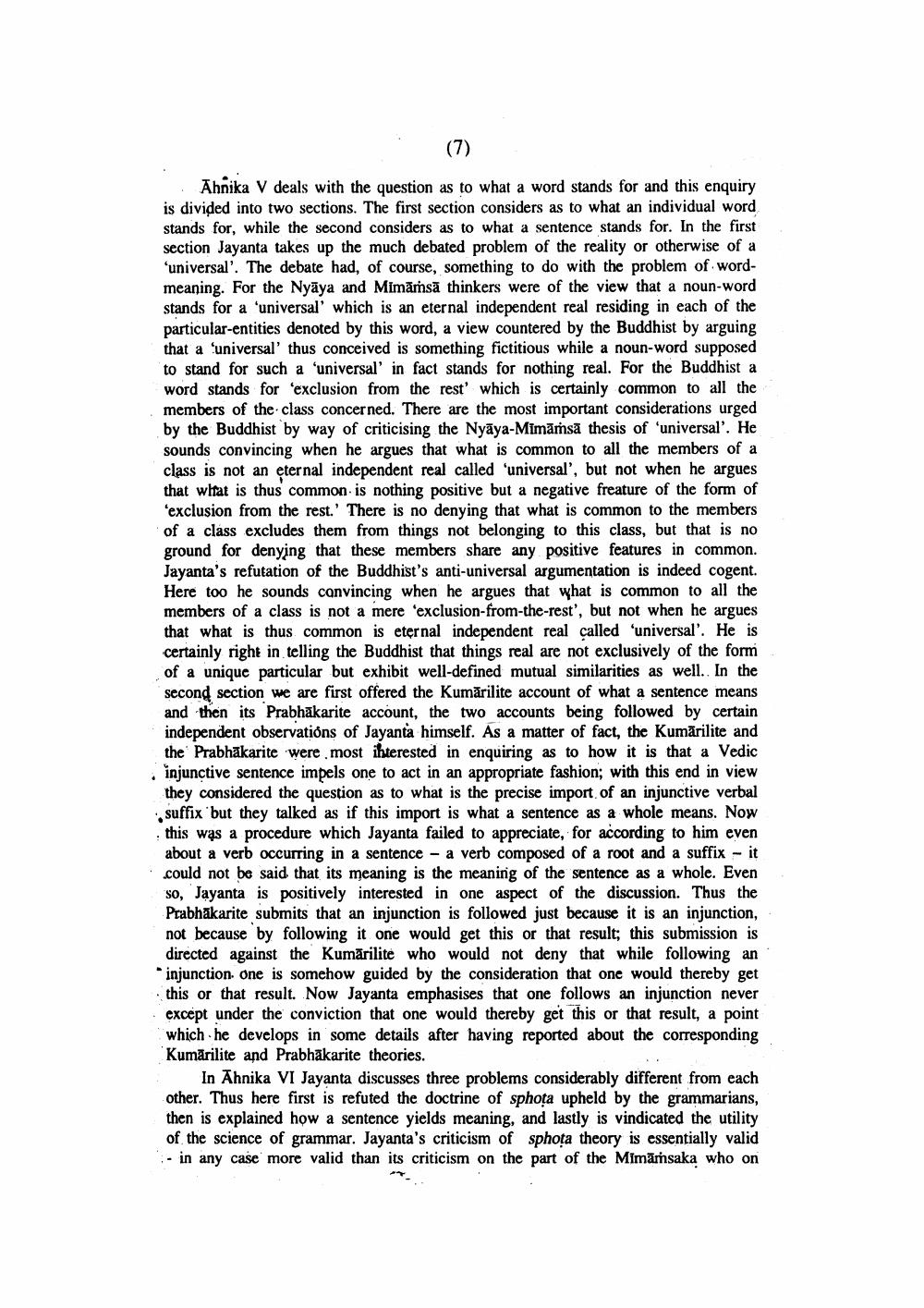Book Title: Indian Logic Part 03 Author(s): Nagin J Shah Publisher: Sanskrit Sanskriti Granthmala View full book textPage 8
________________ Ahnika V deals with the question as to what a word stands for and this enquiry is divided into two sections. The first section considers as to what an individual word stands for, while the second considers as to what a sentence stands for. In the first section Jayanta takes up the much debated problem of the reality or otherwise of a ‘universal'. The debate had, of course, something to do with the problem of wordmeaning. For the Nyāya and Mimāṁsā thinkers were of the view that a noun-word stands for a 'universal' which is an eternal independent real residing in each of the particular-entities denoted by this word, a view countered by the Buddhist by arguing that a universal' thus conceived is something fictitious while a noun-word supposed to stand for such a 'universal' in fact stands for nothing real. For the Buddhist a word stands for 'exclusion from the rest' which is certainly common to all the members of the class concerned. There are the most important considerations urged by the Buddhist by way of criticising the Nyāya-Mimāṁsa thesis of 'universal'. He sounds convincing when he argues that what is common to all the members of a class is not an eternal independent real called 'universal', but not when he argues that witat is thus common is nothing positive but a negative freature of the form of 'exclusion from the rest.' There is no denying that what is common to the members of a class excludes them from things not belonging to this class, but that is no ground for denying that these members share any positive features in common. Jayanta's refutation of the Buddhist's anti-universal argumentation is indeed cogent. Here too he sounds convincing when he argues that what is common to all the members of a class is not a mere 'exclusion-from-the-rest', but not when he argues that what is thus common is eternal independent real called 'universal'. He is certainly right in telling the Buddhist that things real are not exclusively of the form of a unique particular but exhibit well-defined mutual similarities as well. In the second section we are first offered the Kumārilite account of what a sentence means and then its Prabhakarite account, the two accounts being followed by certain independent observations of Jayanta himself. As a matter of fact, the Kumärilite and the Prabhakarite were most ihterested in enquiring as to how it is that a Vedic injunctive sentence impels one to act in an appropriate fashion; with this end in view they considered the question as to what is the precise import of an injunctive verbal suffix 'but they talked as if this import is what a sentence as a whole means. Now this was a procedure which Jayanta failed to appreciate, for according to him even about a verb occurring in a sentence - a verb composed of a root and a suffix - it .could not be said that its meaning is the meaning of the sentence as a whole. Even so, Jayanta is positively interested in one aspect of the discussion. Thus the Prabhakarite submits that an injunction is followed just because it is an injunction, not because by following it one would get this or that result; this submission is directed against the Kumārilite who would not deny that while following an injunction one is somehow guided by the consideration that one would thereby get this or that result. Now Jayanta emphasises that one follows an injunction never except under the conviction that one would thereby get this or that result, a point which he develops in some details after having reported about the corresponding Kumārilite and Prabhākarite theories. In Ahnika VI Jayanta discusses three problems considerably different from each other. Thus here first is refuted the doctrine of sphoța upheld by the grammarians, then is explained how a sentence yields meaning, and lastly is vindicated the utility of the science of grammar. Jayanta's criticism of sphota theory is essentially valid - in any case more valid than its criticism on the part of the Mimārsaka who onPage Navigation
1 ... 6 7 8 9 10 11 12 13 14 15 16 17 18 19 20 21 22 23 24 25 26 27 28 29 30 31 32 33 34 35 36 37 38 39 40 41 42 43 44 45 46 47 48 49 50 51 52 53 54 55 56 57 58 59 60 61 62 63 64 65 66 67 68 69 70 71 72 73 74 75 76 77 78 79 80 81 82 ... 226
